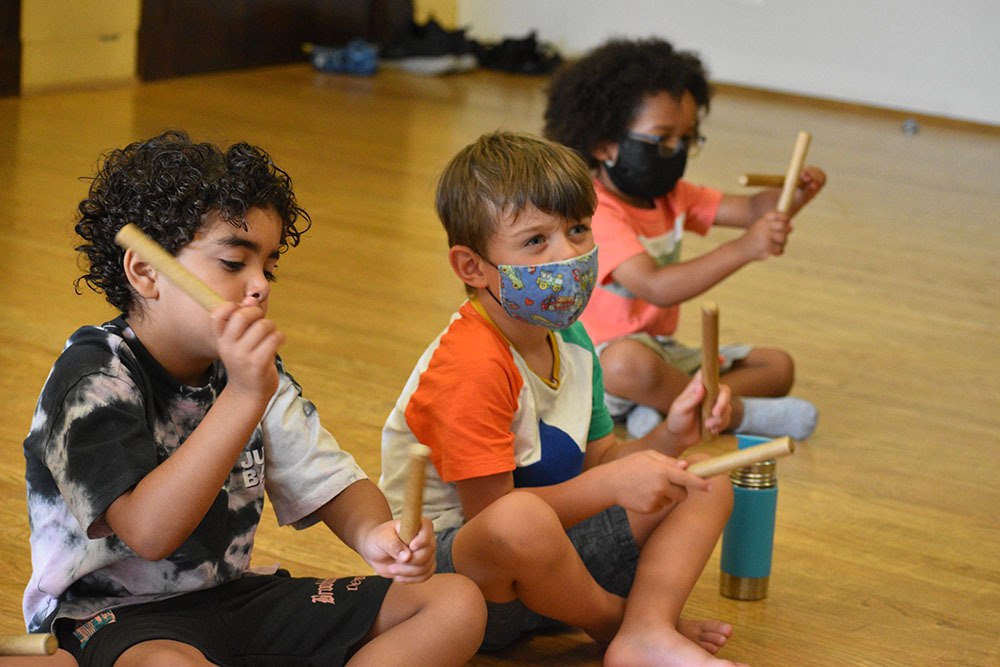When selecting an after-school or weekend class for you child, not only do you have to decide at what age to begin lessons, you also have to guess which type of class is the best match.
Would Johnny like piano lessons or workouts at the kids’ gym? Would Emily take to puppet-making or learning the trapeze? Standard advice is to try several activities and see which one sticks. But extracurricular activity providers say a child’s temperament and inclinations can correspond to certain types of classes.
Ages 3-5
“Trust your observations,” says Karen Chigounis, arts education director for the Perkins Center for the Arts in Moorestown and Collingswood, NJ. An art class might be great for “a kid who doodles, who loves to draw in the sand. Kids are really smart and they give us clues all the time as to what they want to do.”
A music activity can be an instant hit with kids who “sing constantly, like to hear parents sing to them and like to sing songs with them,” says Polly Murray, artistic director of ChildrenSong of New Jersey, a Haddonfield-based choral program. “They make up melodies during play time and enjoy noise makers — drums, whistles, etc. They like to move to music of any type, especially with a prop like a scarf or ribbon wand.”
Shana Kennedy, director of the Philadelphia School of Circus Arts, says her classes are a great match for “physically active, energetic kids — the ‘monkey’ kids who want to climb on everything.”
Maureen Mullin Fowler, education director for the Arden Theatre Company in Philadelphia, says beginning acting classes are great for kids “who like to play dress up” or enjoy imagining stories.
You can sometimes spot kids who naturally take to dance “when the music comes on and they dance, or if they’re seeing a performance on TV and are riveted to it,” says Tricia Sloan of the Tricia Sloan Dance Center in Wenonah, NJ. “Take them to see something with dance or show them a DVD and see if they like it.”
 Ages 6-9
Ages 6-9
As kids’ personalities and skills develop, activities can sometimes match needs. For example, Time 4 Drama, a program offered at area schools and activity centers, uses speaking, drama and movement to develop kids’ confidence and self-esteem.
The program offers particular “help with shyness and help with speech,” says president Toni Thompson, which can help “a child who is uncomfortable in his own skin.” Acting classes are great for kids “who enjoy creating original stories and performing them,” says Fowler.
A physical activity can help most children who don’t get enough exercise or need a confidence boost, especially kids who tend to get frustrated, says Catie Haig, owner of The Little Gym of Abington (PA). “Kids can make mistakes and learn from them, and challenge their growing bodies to continue to move for at least 30 minutes,” she says. “The more they move, the less frustration and anger they experience.”
At this age, The Music School of Delaware helps kids already interested in music to explore their talents, says executive director Cheri Astolfi. The school offers an exploratory class in which children try vocal instruction and lessons in the flute, violin and piano. “Every child has the capability to have musical talent,” says Astolfi. “The key is to find what that talent is.”
 Ages 10-12
Ages 10-12
After-school classes get tweens away from the TV and social activities that typically consume 20-25 hours of their weekly time. By now, your child might be telling you where his interests lie — or don’t. Kennedy says the circus arts can be just right for children who need a physical challenge but are “less inclined toward traditional sports, the go-their-own-way sort of kids.”
ChildrenSong’s choral music program can appeal to young singers who “have a strong interest in improving on their voice and in singing more challenging music than their school or church choir can provide,” says Murray.
Middle schoolers might discover that they “have an interest in the theater, but not being on stage,” says Fowler. A theater design class, which can involve stagecraft or costumes, could be just right for them.
Teens
A good option for busy teens looking for a new skill can be short classes. “Older students have so many activities going on that they have trouble committing to 6-week or 8-week classes,” notes Fowler.
 “We have kids who are older and just want to do (dance) once a week, whether it’s ballet, jazz, funk or hip-hop,” says Sloan.
“We have kids who are older and just want to do (dance) once a week, whether it’s ballet, jazz, funk or hip-hop,” says Sloan.
Classes can also help teens achieve personal goals. For example, a circus class can help kids who could use “the self-esteem boost of getting terrifically fit and strong,” says Kennedy.
For teens with a passion, some classes offer crucial skills development. At ChildrenSong, teen singers often “know that music is a part of them and what they want to do either as a life-long hobby or career,” says Murray. For them, private voice lessons supplement choral activities, providing a bridge to college studies or high-level auditions. Many other types of classes provide such advanced training.
All Kids, All Ages
The Music School of Delaware’s Cheri Astolfi makes the case that many types of classes will benefit any child. “Every child has musical potential, and the earlier you start them, the more opportunity you have to develop that potential,” she says.
“I would love to see all children introduced to the arts in the way that we do with sports,” says Karen Chigounis of the Perkins Center for the Arts. “An arts experience is such a kinetic way of looking, seeing or moving that every child’s going to benefit.”
Stanley Thomas is a local freelance writer.






